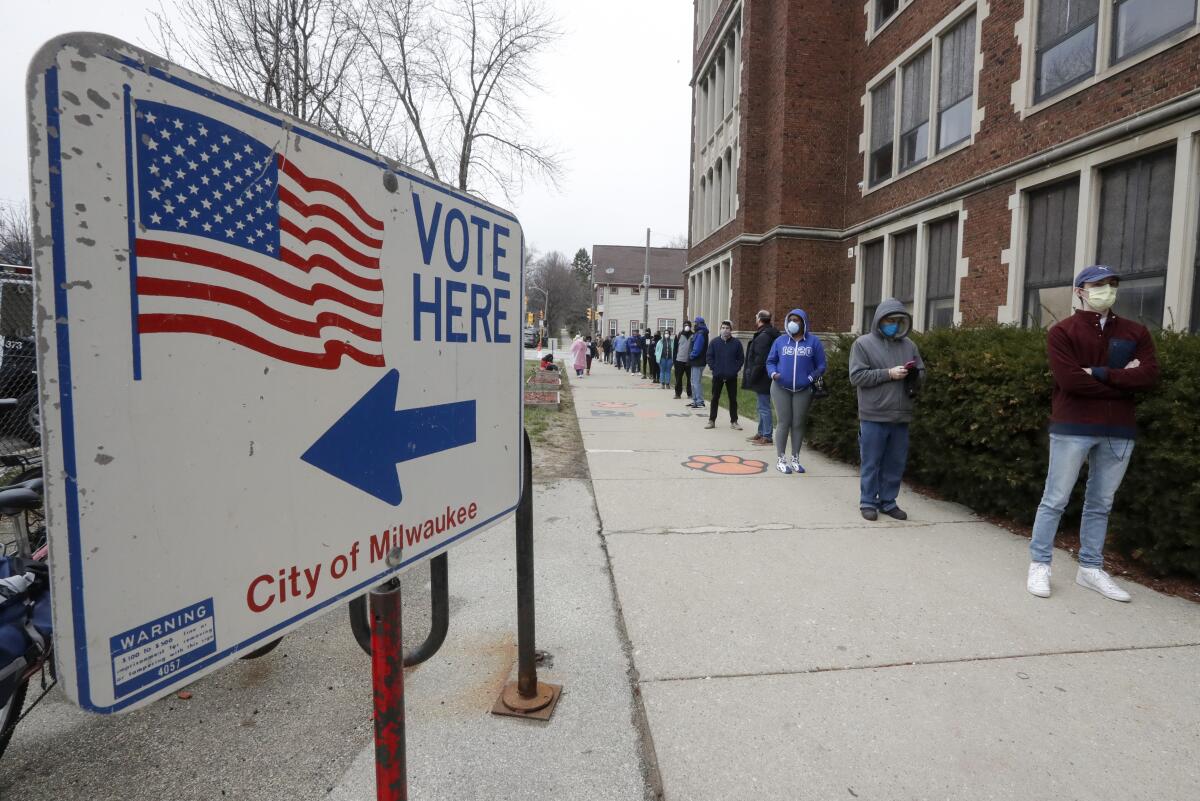The Supreme Court played partisan politics in Wisconsin. It could unleash a political apocalypse in November

- Share via
The Supreme Court’s intervention in the Wisconsin election this week — last-minute, avoidable and slapdash — was disquieting, not least as a sign of the court’s potential role in the upcoming presidential election.
The unsigned opinion on behalf of the five-justice conservative majority evoked future dangers, but it also harked back to the past, specifically to the infamous opinion in Bush vs. Gore, which wrestled the 2000 presidential election to the ground.
As in Bush vs. Gore, the events in Wisconsin proceeded in madcap fashion, bouncing from state officials all the way up to the U.S. Supreme Court, and at each stop, favoring the party affiliation of the particular decision maker. That’s toxic for our perceptions of an apolitical rule of law, but it doesn’t necessarily mean the court got it wrong, or acted injudiciously. If you take a closer look at the decision and its surrounding circumstances, however, that conclusion is inescapable.
First, some background: Wisconsin’s Democratic governor wanted Tuesday’s election postponed because of the coronavirus outbreak. The state’s Republican-led Legislature and its conservative Supreme Court said no. Groups of voters then brought suit in federal district court, where a judge decided that the bedlam on the ground — a scramble for absentee ballots, election workers quitting in droves, vanishing polling places — violated Wisconsinites’ constitutional right to vote. The court ordered the state to accept absentee ballots for an extra six days. When the order stood on appeal, Republicans turned to the U.S. Supreme Court.
With hours to go before the polls were to open on April 7, the high court majority upended the absentee ballot order. It didn’t reverse — indeed it didn’t even address — the district court’s determination of a constitutional violation. Instead, the conservative justices fastened on what they took to be the sole question before the court, “a narrow, technical” issue about whether voters’ ballots could be postmarked after election day. They said no: Ballots would be received up to six days later, but they had to be postmarked no later than April 7.
It’s a perverse decision. The electoral problem created by the coronavirus crisis wasn’t that the Post Office needed more time to deliver the mail, but that voters needed more time to execute what in normal circumstances would be a straightforward exercise.
Justice Ruth Bader Ginsburg, in her (signed) dissent for the court’s four liberals, didn’t mince words: “The question here is whether tens of thousands of Wisconsin citizens can vote safely in the midst of a pandemic. Under the District Court’s order, they would be able to do so. ... With the majority’s [decision], that will not be possible. Either they will have to brave the polls, endangering their own and others’ safety. Or they will lose their right to vote, through no fault of their own.”
We watched the outcome on Tuesday — voters in masks waiting hours in long, long socially distant lines to get into a handful of polling places across the state. It’s impossible to quickly calculate the cost in disenfranchised voters and public health, but it is almost certainly substantial.
And those costs undoubtedly fell disproportionately on Wisconsin’s African American voters. Milwaukee, with a large black population, had just five open polling places instead of the usual 180. Its black residents constitute 40% of the state’s virus fatalities, and we know their rate of return of absentee ballots in elections lags well behind that of predominantly white counties. For these voters, the court’s insistence on a legal technicality displayed a callousness and a judicial myopia worthy of Mr. Magoo.
By overlooking the viral lightning and thunder raging all around, and approaching the Wisconsin case as if it concerned a trivial procedural issue, the court echoed what was the most notorious, and shameful feature of Bush vs. Gore: its insistence that its politicized decision was completely one-off, with no precedential value for any other case. Similarly, the court chose to reframe the case in such picayune technical terms that its decision also has virtually no broader legal import; the ruling simply ensured that this particular election would take place on terms favorable to Wisconsin Republicans. (The GOP hoped lower turnout would give them an edge in a down-ballot state Supreme Court contest.)
Monday’s decision is a sobering illustration of Justice Robert Jackson’s adage about Supreme Court rulings: “We are not final because we are infallible, but we are infallible only because we are final.”
Any number of issues and disputes could set up harrowing legal battles over the November presidential election, all of them magnified by the unknowns of a global pandemic. If the Supreme Court were to jump in unnecessarily again, and decide the nation’s fate on what appears to be primarily partisan political grounds, it would be apocalyptic for the political process, if not the fate of the American experiment.
The court’s actions in Wisconsin are a reminder that the worst can happen. The country has to do everything it can — beginning with legislative action establishing widespread voting by mail — to ensure that that possibility is never even in play.
Harry Litman is a former U.S. attorney and host of the podcast “Talking Feds.” @harrylitman
More to Read
A cure for the common opinion
Get thought-provoking perspectives with our weekly newsletter.
You may occasionally receive promotional content from the Los Angeles Times.









